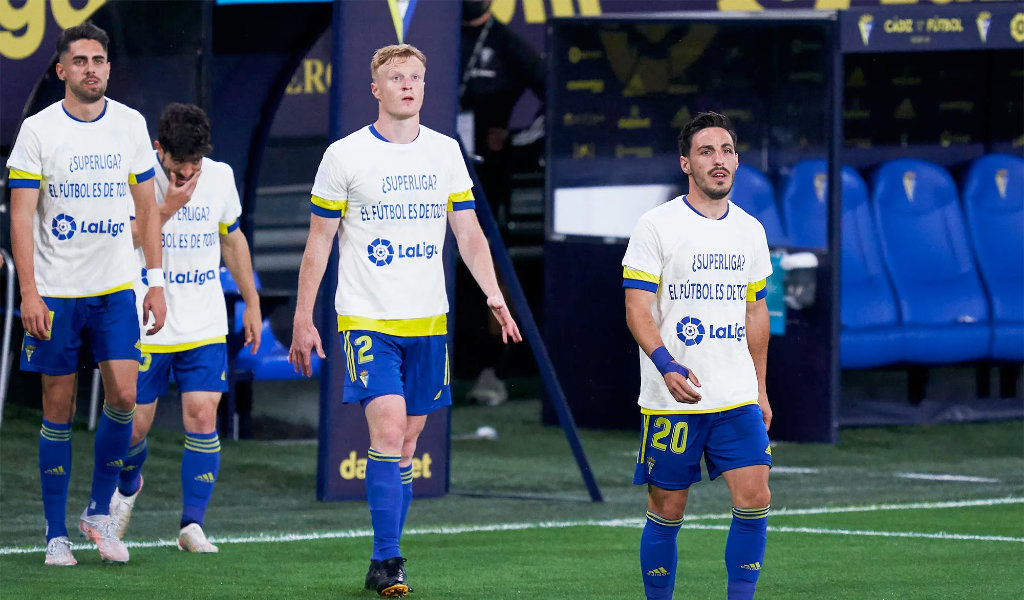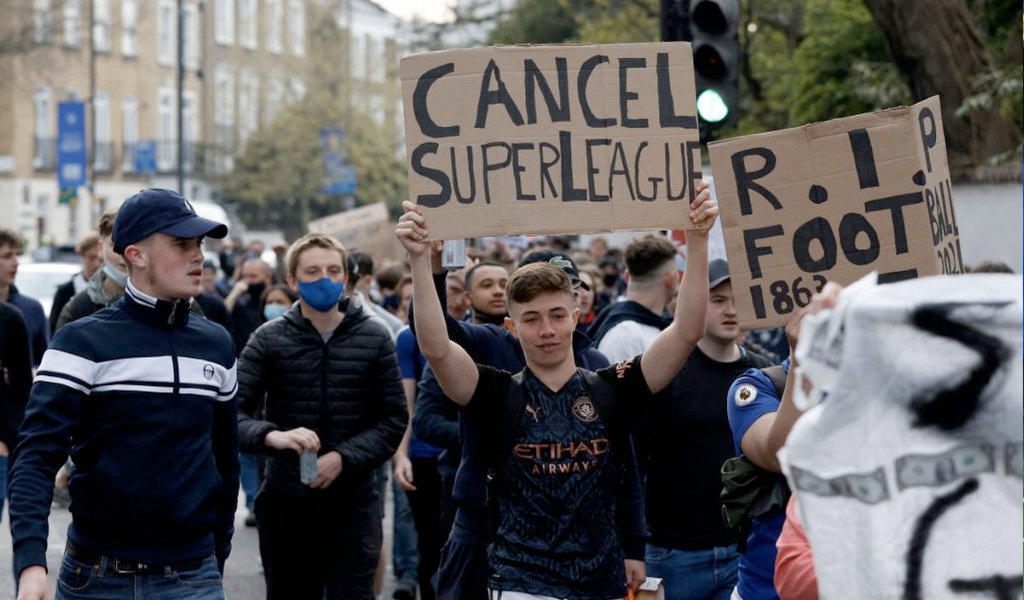There is a tacit understanding throughout European soccer: not all clubs are created equal, but they are all part of the same family. From powerhouses competing in the Premier League and Champions League to nondescript franchises playing in smaller, localized divisions, every team is supposed to matter. The creation of the Super League threatened that dynamic.
And then, just like that, it was gone, leaving plenty of questions in its wake.
Chief among those queries: What gives? What was the point of this breakaway league? And where does UEFA (Union of European Football Association) go from here?

What Was The European Super League?
Soccer is the world's sport, but it is also an intensely intimate affair. Local fans care about their most regional teams, even if they're not exceptionally good or popular.
The business model for European soccer has always attempted to protect those clubs. And that has entailed buy-in from the top on down. Bigger and better teams have needed to be okay splitting revenue with clubs that aren't generating as much themselves.
It is from this perceived inequity that the Super League was born. Too many of the biggest franchises believed they were getting short-shifted with the current revenue split, so they formed their own European Super League that was closed off to every other club.
The 12 teams to form the ESL: Arsenal, Chelsea, Liverpool, Manchester United, Manchester City, and Tottenham from England. Real Madrid, Barcelona, and Atlético Madrid from Spain. And Juventus, AC Milan and Inter Milan from Italy.
Just reading that collection of teams boggles the mind. It is a who's who of defining franchises. These squads broke away from soccer's primary governing body on the basis that too many games in the Champions League were meaningless, and that the competitions were diluted. Really, it was about money—increasing their profits.
Hundreds of millions of fans watch the Champions League every year. Even if the competition is watered down, it is not a pointless venture. These 12 teams wanted to capitalize on their cachet and make a clean split.
Except, their split was anything but clean.
The Downfall Of The European Super League
News of the Super League didn't so much break as trickle out. It was announced, kind of, late on Sunday, April 19, and met with widespread confusion.
Few things were cleared up when the rest of the world woke up on Monday morning. There was never really a coherent announcement or satisfying joint explanation. At the time, the only exclusive interview on the matter came from Real Madrid president and proposed Super League chairman Florentino Perez, and he didn't offer much information.
Almost nobody stood behind the decision of the 12 founding members of the Super League. Though they all claimed—albeit, again, not jointly—this would be good for soccer's pyramid business structure, the move was denounced by UEFA, FIFA, and fans galore.
UEFA President Aleksander Ceferin referred to the lot as "snakes." And the British Prime Minister, despite being tasked with handling the ongoing global pandemic, felt compelled to denounce the Super League. Plenty of people, from fans to media members to those on the board responsible for planning the World Cup, claimed the move was actually illegal.
To say this was a disaster would be an understatement. And whether there was legal precedent for the 12 founding members didn't matter as it turns out. Six of the teams reneged on their involvement almost immediately: Arsenal, Chelsea, Liverpool, Manchester United, Manchester City, and Tottenham—all the squads from England.
By breaking away from their breakaway league (what a sentence!), these clubs put the remaining six—Real Madrid, Barcelona, Atlético Madrid, Juventus, AC Milan, and Inter Milan—in an impossible bind. Without the support of the other clubs, they couldn't go on with the English Super League. They, too, were forced to disband the idea.

Is The European Super League Gone For Good?
To answer this question in one word: No.
The Super League is not necessarily a novel concept. Flagship soccer franchises have been unhappy with the current UEFA structure for some time. They firmly believe they would turn more of a profit through new TV deals alone than they make now if they formed a breakaway league.
This line of thinking begins to explain the slapdash method in which the ESL was "announced." The teams involved seemed more worried about currying favor with the government and business partners than the fans.
Failing to focus on the latter came back to bite them. Not only was the rebel league formed without warning, but the benefits weren't explained in Layman's terms. The ESL wasn't prepared to simplify their argument—or to even appeal to the fans at all.
As a result, European soccer's governing body dodged a bullet. For now.
The ramifications of the breakaway league are going to be felt for some time. Jobs were lost, like that of Ed Woodward, Manchester United's top executive who abruptly resigned after the failed Super League formation. Egos were bruised.
More important than anything, the UEFA knows for sure where so many of its most important teams stand, and that they're prepared to do something about it. So yes, there could be a "next time." When billions upon billions of dollars are at stake, the door is never closed. Don't be surprised if the Super League attempts a similar breakaway in a few years in a more methodical manner.
Whether the clubs can be dissuaded from trying this again is anyone's guess. It will demand reform by UEFA. Maybe they allow the Super League to exist under the condition it is opened to more clubs. Perhaps they restructure the current revenue-sharing model, in a way that rewards the highest-earning teams without completely jilting the domestic leagues.
This is all speculation. We can't be sure of anything right now. Only time will tell what happens next.
Check out this list of the best online sportsbooks so you can decide which to use for all your soccer betting odds:
-
EXCLUSIVE BONUS
 50% bonus up to $250Play Now
50% bonus up to $250Play NowT&C apply, 18+, Play responsibly
-
EXCLUSIVE BONUS
 125% up to $1,250Play Now
125% up to $1,250Play NowT&C apply, 18+, Play responsibly
-
EXCLUSIVE BONUS
 225% up to $3,625Play Now
225% up to $3,625Play NowT&C apply, 18+, Play responsibly
-
 50% bonus up to $250Play Now
50% bonus up to $250Play NowT&C apply, 18+, Play responsibly
-
 125% up to $2,500Play Now
125% up to $2,500Play NowT&C apply, 18+, Play responsibly








